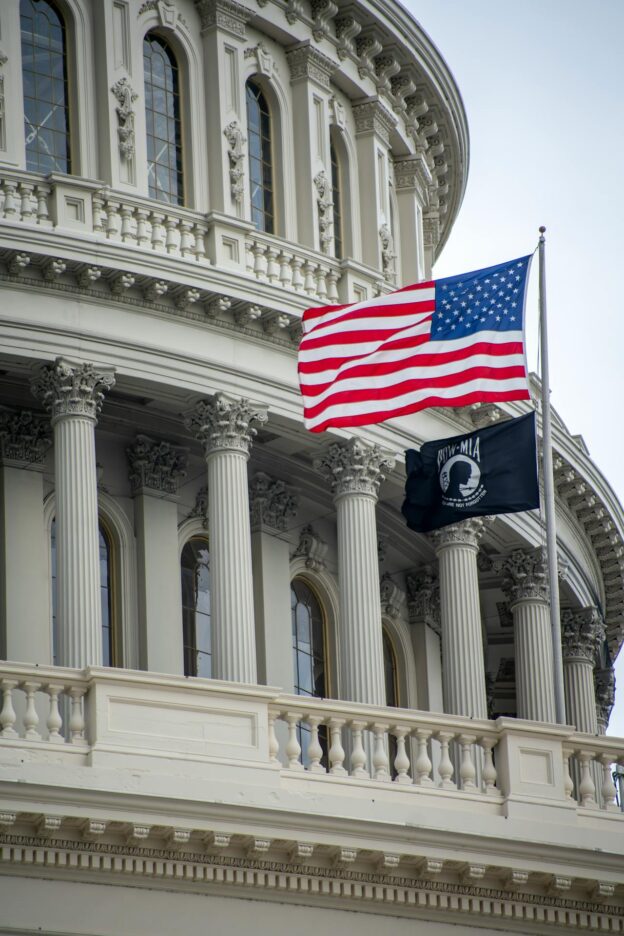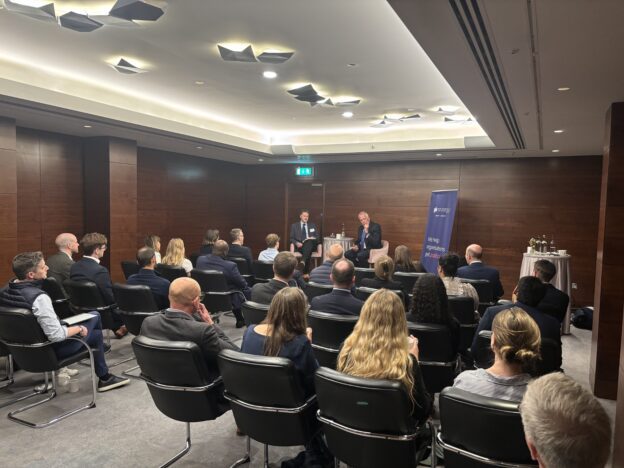For analysis on the government’s 10-Year Health Plan from GK’s Strategic Advisers Steve Brine and Phil Hope, please click the following link: GK Strategy – 10 Year Health Plan


For analysis on the government’s 10-Year Health Plan from GK’s Strategic Advisers Steve Brine and Phil Hope, please click the following link: GK Strategy – 10 Year Health Plan

By Lizzie Wills, Senior Partner & Head of Private Equity
A bill making its way through the US Congress could present meaningful new taxes on US holdings of investors domiciled in the UK, as well as several EU member countries – another in a series of new risks to emerge from the newly fraught relationship between America and its historic allies. While passage of the bill is not guaranteed, potentially impacted parties should begin to think now about how to react to potential changes.
The effort in the US Congress to impose new taxes on many foreign investments in the US is part of a broader tax and spending package that recently passed the US House of Representatives and is currently being debated in the Senate. The bill would be passed under a legislative vehicle known as reconciliation, which allows a bill to pass under restricted circumstances with simple majorities of both the House and Senate, circumventing the usual requirement to secure 60 Senate votes.
The foreign investment tax package is known as Section 899 for the new section of the US tax code required to implement it. Section 899 would impose incremental taxes above current rates on the value of income or sale proceeds of many US holdings (US Treasury securities would be exempt) held by institutional investors, individuals and governments domiciled in countries that have imposed what the bill characterises as “discriminatory” taxes on the US. The discriminatory threshold would automatically include countries that have levied Digital Service Taxes (DSTs) on US-based technology firms – which includes the UK, France and Spain – as well as taxes imposed under the Undertaxed Profits Rule, a standard developed by the Organisation for Economic Co-operation and Development (OECD) to attempt to impose minimum tax rates on multinationals.
Since the House version of the reconciliation bill passed on 22 May 22, critics have dubbed Section 899 the “revenge tax”, predicting that if passed the provisions would hurt US asset prices, cause interest rates to rise and the US dollar to tank considering the US$30 trillion in US assets held by foreigners. The Tax Foundation, a US think tank, estimates the new taxes would impact some 80% of the foreign direct investments into the US. Yet US policymakers appear to be largely unmoved thus far by the opposition. The Senate Finance Committee has released draft language pegging the incremental taxes at 15% (5% per year for each of three years) starting in 2027, watering down the House version but keeping it largely intact. The notion of raising taxes on foreign investors is completely consistent with the “America First” mindset of the Trump administration and Republican congressional leaders. The Congressional Budget Office (CBO), a non-partisan body that estimates the fiscal impact of proposed legislation, has forecast that the House version of Section 899 would raise US$116 billion over the 10-year budget forecast window, important considering the CBO’s forecast that the bill would add trillions to the already yawning US budget deficit. The Senate’s version of the bill would raise less, given the 15% maximum (versus 20% in the House bill) but would still be expected to generate meaningful revenue.
The broader reconciliation bill has drawn opposition from multiple factions of the Republican party. However, the bulk of the criticism has focused more on the bill’s proposed cuts to the Medicaid health-insurance programme (for moderates) and the projected further widening of the federal budget deficit (for conservatives). By comparison, criticism of Section 899 has been muted. And even if the current version of the bill is scaled back, the temptation for a party that controls the White House, Senate and House to pass a bill through reconciliation is huge – the vehicle was used to pass the tax-reform bill in Trump’s first term, in 2017, as well as the Inflation Reduction Act (IRA) under President Joe Biden in 2021.
Sample countries that have imposed Digital Service Taxes (DSTs) on US Firms
| Austria | Denmark | Belgium |
| Canada | Hungary | Turkey |
| France | Italy | Peru |
| India | Poland | Colombia |
| UK | Spain | Kenya |
Source: Tax Foundation
What can non-US investors with US holdings do in response? Both the Senate and House versions of the bill specify that the new taxes will only be imposed on entities with greater than 50% equity ownership outside the US. Jointly held funds with divided US/non US ownership could shift majority control back to the US partner. Other strategies will surely emerge to adapt to the new rules should they come to pass. But investors would do well to start thinking about them sooner rather than later.
If you’re interested in discussing this in more detail please be in touch with Lizzie Wills on lizzie.wills@gkstrategy.com.

GK had the pleasure of hosting former Treasury and education minister David Laws and the Financial Times’ Economics Commentator Chris Giles in our latest webinar on Thursday (12th June) to discuss the winners and losers from the government’s spending review, and what it means for business.
The spending review is a significant moment in the political calendar. The settlements it confirms set departmental day-to-day budgets for the next three years (2026-27, 2027-28 and 2028-29) and capital expenditure for the next four (until 2029-30). It is also the moment when No.10 and the Treasury must publicly commit the funds to support their political objectives – in essence, we get to see where spending is going to be prioritised and where it is not.
In the webinar, David and Chris detailed what the spending review means for overall public spending, where the government could come undone, and the possibility of future tax rises. You can read a summary of their key takeaways below:
The spending review is not about making new money available or introducing new taxes. Spending reviews are all about the allocation of a pre-determined spending envelope which, in this instance, the Chancellor set out in the October budget last year. It does not introduce any new taxes or make new money available. Instead, it confirms what areas of public spending the government wants to prioritise, and which departments will have to be squeezed.
The departmental settlements do not represent a return to the austerity years. While the overall spending envelope is tight – especially given growing pressure on public spending across health, pensions and defence – day-to-day spending is still rising by 1.2% per year in real terms (i.e. accounting for inflation) over the spending review period. This means it is broadly in line with the departmental spending settlements put forward by various governments since 2019.
A lot of the spending assumptions depend on public sector productivity improving, which is no guarantee. Public sector productivity has declined since the Covid-19 pandemic and in 2024 it fell by 0.3%. The Office for Budget Responsibility (OBR) has historically assumed quite generous improvements in public sector productivity each year which is a key component of its overall economic growth metric.
If the OBR significantly revises down its assumptions about improvements in productivity, this could seriously impact the funds it is projecting the government will have to work with over the spending review period. This increases the likelihood of the government having to do introduce large tax rises at the autumn budget.
Defence will continue to put pressure on the government’s overall spending envelope. Since the end of the Second World War, successive governments have used cuts to defence as a means of boosting other areas of public spending, most notably health. Persistent global instability and geopolitical uncertainty means that higher levels of defence spending are likely to continue for the foreseeable future. No.10 and the Treasury will have to contend with this new spending pressure as demographic challenges continue to pile up and economic growth remains sluggish.
The NHS is the big winner from the spending review, albeit with a smaller settlement than it has historically received. Health secretary Wes Streeting will undoubtedly be the happiest around the Cabinet table following the confirmation of the Department of Health and Social Care’s settlement, with spending on the NHS set to grow by 3% per year in real terms. However, this is below historic average rises of approximately 4-5%. With a growing elderly population and people living with complex conditions for longer, the funding put forward in the spending review settlement is unlikely to significantly move the dial on the performance of the NHS.
Small tax rises are likely at the autumn budget to meet the Chancellor’s fiscal rules. The government has committed to meet day-to-day expenditure through its own revenues by 2029-30. This means its current budget will have to be in balance or surplus by the end of the decade, and any money the government does borrow will be to invest. If the OBR projects that the government is not on course to meet this fiscal rule (or any of its others), then Chancellor Rachel Reeves will be forced to come back for a second round of tax rises or decide to break a fiscal rule. Either look fairly unpalatable to the government given where they currently are in the opinion polls.
A cabinet reshuffle should be expected in the second half of 2026 as the government begins to ramp up to the next general election. 2026 is projected to a big election year in the UK. Elections are due to take place for the Scottish Parliament and Welsh Assembly, along with a series of newly created unitary authorities. Should the results prove poor for Labour, as current polling indicates they will, then Prime Minister Keir Starmer is likely to reshuffle his cabinet to get his top team in place as the No.10 machine starts to think about the next general election in 2029.

For detailed analysis of the government’s spending review, please click the following link: GK Strategy – Spending Review 2025

The government has made its stance on health and welfare clear. The overarching narrative underpinning the Department for Work and Pensions’ (DWP’s) green paper on welfare reform, published in March 2025, is ‘good work is good for health and being out of work can worsen health’.
Coupled with the Secretary of State for Health and Social Care Wes Streeting’s recent comments that an over-diagnosis of mental health conditions is preventing people from working, it is evident that the government sees work as a key component of the welfare state.
This marks a distinct shift in how work, health and welfare have historically interacted in policymaking. Where once the welfare system was seen primarily as a safety net, it is now being recast as a springboard that supports individuals back into the labour market.
The government recognises that something has shifted in the labour market post-Covid-19. There has been a 45% increase in health-related benefits claimants since 2019-20 and more than 9.3 million people out of work. There are swathes of statistics which demonstrate that Britain’s workforce has not fully recovered from the pandemic and the current level of sickness and absenteeism is unsustainable.
Given the scale of the issue, the government has sought to identify how improving health outcomes might support people into work and enable them to stay there. Ideas such as offering weight loss jabs, dubbed ’jabs for jobs’, were floated at the end of last year. This gives a clear signal that the government is keen to encourage people back into the workplace and is open to non-conventional methods of doing so.
While DWP consults industry and businesses on its planned welfare reforms, an opportunity has arisen for those focused on supporting the government’s vision for work and welfare. Employers should be prepared to play a larger role in supporting the workforce to remain engaged in the labour market. This offers significant opportunities for occupational health providers who can support employers to promote the health and wellbeing of their staff.
Schemes such as mental health and wellbeing programmes will become increasingly common in employment offerings as businesses take on a growing role in a broader, work-led approach to welfare. Occupational health providers who can help fill this gap between welfare, health and long-term employment are well placed to help facilitate the government’s policy objectives.
Reducing economic inactivity is a key priority for the government in its mission to kickstart growth. By implementing supportive workplace schemes and collaborating with private occupational health providers, employers can not only improve individual outcomes but also contribute to broader societal and economic resilience.
The question now for policymakers is exactly how occupational health providers can support businesses to deliver on the government’s objectives for welfare reform. Ministers, civil servants and parliamentarians are keen to understand the art of the possible and how they can work with providers to support workers to remain as active participants in the UK’s workforce.
Please contact Lauren Atkins (lauren.atkins@gkstrategy.com) if you would like to discuss occupational health and the government’s welfare reforms in more detail.

GK Strategy was pleased to host former Chair of NHS England Richard Meddings and former health minister and Chair of the Health and Social Care Committee Steve Brine for an ‘in conversation with’ discussion on Thursday 15 May to examine some of the challenges facing the government, the Department of Health and Social Care and the NHS 10 months into Labour’s term in office.
Meddings and Brine took a deep dive into a range of issues affecting the health and social care sector, exploring the implications for investors and service providers. From funding pressures to the abolition of NHS England, the discussion drew on our speakers’ extensive experience to evaluate the road ahead for the health system and the reforms the government will need to deliver to meet its ambitious policy objectives.
Much of the discussion focused on the NHS and the role of ICBs in a reformed health system following the announcement that NHS England would be abolished. There was agreement that health secretary Wes Streeting had received a tough inheritance, including mounting pressures on the health service and a poor fiscal climate making a significant injection of additional funding unlikely. The panellists highlighted the urgent need to redesign governance frameworks that better meet the demands of a modern health service.
Meddings and Brine spoke in detail about the role of technology in reforming the delivery of healthcare. They agreed there needs to be a steady stream of investment to maximise the increasing role AI will play in improving patient care and delivering efficiency savings within the NHS. The pair emphasised the need for Streeting to secure the ear of Chancellor of the Exchequer, Rachel Reeves, who they argued will need to prioritise health targets despite a constrained financial budget.
The two panellists agreed that reducing the elective care backlog and meeting the 18-week referral to treatment target was the key retail offer to voters at the general election and will be the main health priority for the government. This is despite wider initiatives that might have more significant long-term outcomes for the health of the UK’s population. Other short-term priorities for the NHS that were discussed included reducing the number of people in urgent care, increasing access to primary care, and improving cancer detection rates.
Towards the end of the session, the discussion shifted to the upcoming 10-Year Health Plan which will set out the government’s healthcare reforms in detail. Meddings and Brine agreed it is likely to prioritise prevention, the shift from hospital-based to community care and greater digital integration, which were the three ambitions put forward by Labour pre-election. The panellists highlighted that meaningful progress will depend on early intervention strategies and targeted investment, particularly in tackling obesity, cancer and mental health challenges.
For investors and stakeholders, the panel’s message was clear: steady investment in health, coupled with a pragmatic embrace of technology and AI presents a significant opportunity to reshape the delivery of healthcare at a time when demands on the NHS continues to rise.
Health, social care, and life sciences is one of the GK’s core sectors. GK supports a range of businesses and investors to navigate the political, policy and regulatory landscape and help them to realise their commercial objectives. Please get in touch if you would like to discuss the impact of politics and policy on your business or investment decisions.